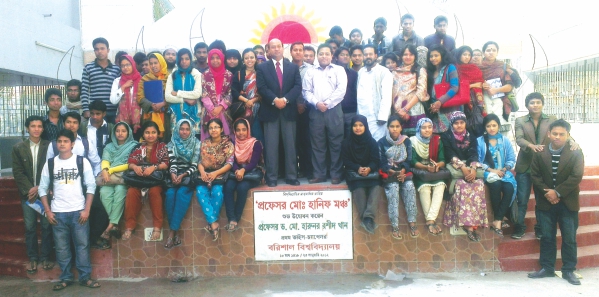Post Campus
The University of Barisal:
An Education Centre Beside The Kirtonkhola
Asrar Chowdhury
Photo Courtesy: Asrar Chowdhury

From the British period and before, Barisal has been at the forefront of education, culture and science. Barisal Zilla School, BM College and other leading education institutes have produced some of the finest sons and daughters of the nation. However, the people of Barisal had to wait a very long time for a university.
In 1973, the Father of the Nation, Bangabandhu Sheikh Mujibur Rahman, made a declaration to establish a university in Barisal. The demand and aspiration of the people of Barisal had to wait, due to unfortunate events in history. Some attempts were made later on, but none saw daylight. In February 2010, The Honourable President, Md Zillur Rahman, appointed Professor Dr Harunor Rashid Khan of The University of Dhaka as the Founding Vice Chancellor. On January 24, 2011 The University of Barisal was established. On 22 February, 2011, The Honourable Prime Minister, Sheikh Hasina, laid the foundation of the university. The waiting for a university in Barisal was worthwhile. This young public university stands on the banks of the Kirtonkhola River, giving it the potential of becoming probably the most beautiful university in Bangladesh and upholding a tradition of excellence in education Barisal has been proud of for centuries.
The University of Barisal is located at Karnakuthi on the banks of the Kirtonkhola River to the East of the Abdur Rob Serniabat Bridge. The size of the campus is fifty acres. The temporary campus is situated in a part of Barisal Zilla School. The university expects to start academic and administrative functions at Karnakuthi within this year.
On January 24, 2012, The University of Barisal started with only fifteen teachers and four hundred students in six departments- Mathematics; English; Sociology; Economics; Management Studies; and Marketing. With two batches (2011-2012 and 2012-13 sessions), the university now has four more departments- Bangla; Accounting and Information System; Soil and Environmental Sciences; and Public Administration; 1,100 students; 38 teachers; 16 officers; and 55 office staff.
My personal experience of the University of Barisal started with a phone call from my student, Md Alauddin, Lecturer in Economics. He told me that the Economics Department invited me to take their department's First year-end viva voce. It would be the first year-end viva voce of the department. The thought of being the first of something in one of our universities was too tempting an opportunity to decline. I had never traveled by launch; and never visited Barisal. I told myself, there's nothing I can lose.
I started from the Buriganga in the evening. The river breeze, reflections of a full-moon on the water is an experience that can only be felt. It cannot be described with words in full justice. In the morning, I reached Kirtonkhola. A welcoming mild cool breeze said, there's more to the picture than meets the eye in Barisal.
The Chair of Economics, Ishita Ahmed, welcomed me. The remaining three teachers, Hazera Tun Nessa, Jyotirmay Biswas and Md Alauddin made me feel at home from the word, go. The first day was spent taking the viva voce. The next day was more or less an off day. At the request of Economics Department, I had the opportunity of being their first guest lecturer. I had to give a talk to the first batch (2011-2012 Session).
A problem with a one-time talk with an undergraduate audience you may never meet again is: it is difficult to introduce something they may not have encountered. I decided to talk on basic concepts the class learned in their first year. Revisiting a concept can be more effective than visiting it the first time. In childhood, many of us have read and memorized two poems of Tagore and Nazrul: “Mone Koro Jeno Bidesh Ghure”; and “Thakbo Nako Boddho Ghore”. At that age, we probably never appreciated the poems. But if we revisit the poems again, we may now see many dimensions that were not visible before.
Keeping this in mind, I talked about scarcity; opportunity & sunk costs; decisions at the margin; marginal versus average decisions; Pareto efficiency and Pareto improvement; and three philosophical foundations of economic theory- post hoc fallacy; ceteris paribus; and fallacy of composition. The first year of any subject or discipline is a time where & when all concepts are better understood and appreciated, the more they are revisited.
After the talk with the First Batch of Economics, the Vice Chancellor, Professor Dr Md Harunor Rashid Khan, and Registrar (Acting), Dr Md Muhasin Uddin (Faculty, Department of English) kindly joined in a group photo with all the teachers and students of the Department of Economics at the Professor Md Hanif Amphitheatre. If a picture is worth a thousand words- to me, the group photo remains a testimony of the warmth and love of the simple, yet wonderful people of Barisal.
It was always a matter of time that a university would be established in Barisal. In modern times, Barisal has produced Sher-E-Bangla AK Fazlul Huq (1873-1962); one of the pioneers of women's liberation, Poet Begum Sufia Kamal (1911-1999); and one of the finest poets of 'Ruposhi Bangla', Jibananda Das (1899-1954), to name just a few. Barisal's contribution to education dates back to the Buddha Era of Bengal. Minnatha (8th Century), one of the prime poets of the Charyapada- the first known text in Bangla- hailed from Barisal. With such a rich & ancient tradition, one can only expect the best from the University of Barisal situated on the banks of the Kirtonkhola.
(The author teaches economic theory at Jahangirnagar University)

| 